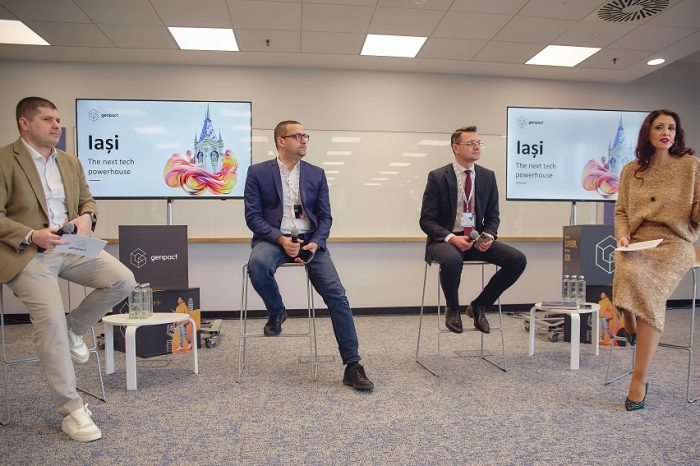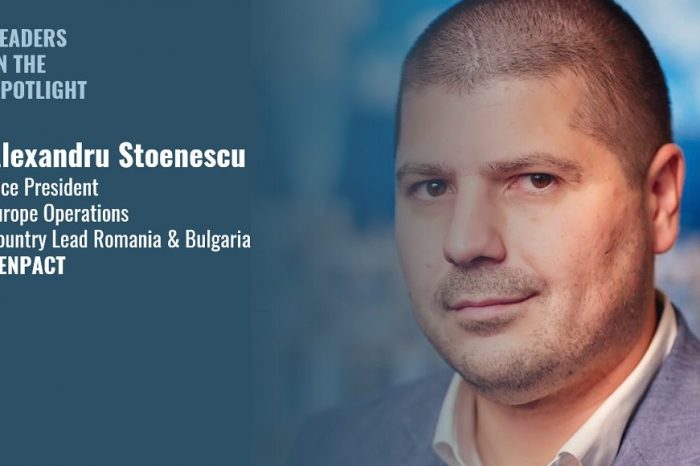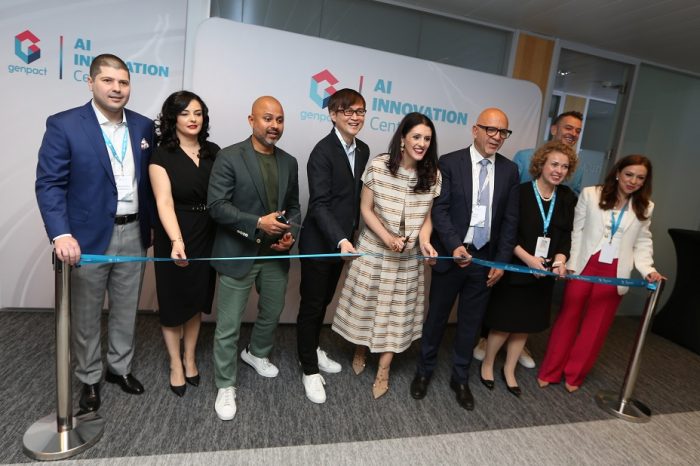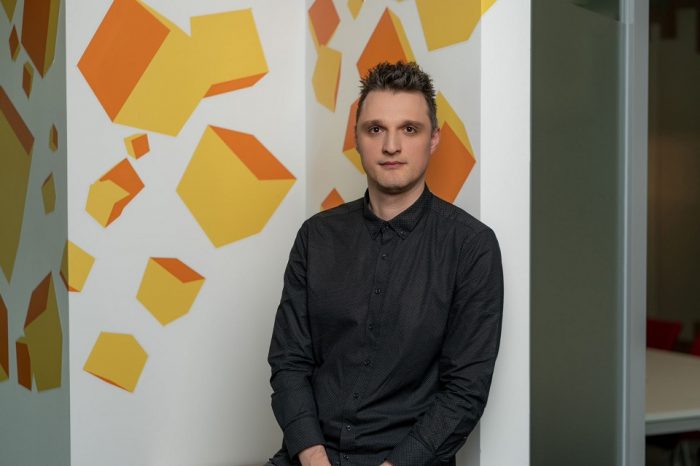Generative AI holds the potential to revolutionize industries, reshape businesses, and address complex challenges

In November, Genpact announced the opening of the Genpact Artificial Intelligence (AI) Innovation Center in London. The center is designed for co-innovation with clients to help unlock business transformation leveraging AI, beyond productivity, in areas such as supply chain management, finance and accounting, customer care, sales and commercial, and insurance underwriting. To support the work at the center, Genpact is upskilling its 125,000-strong workforce and is expected to create new employment opportunities in the UK.
We talked with Shibu Nambiar, Global Hi-Tech Business, Genpact and Marina Vernetti, Chief Operation Officer for EMEA, Genpact to find out several insights on the new development , within the wider perspective of the AI and tech-based solutions evolution in the business environment.
What enabled the collaboration between Genpact and Santander UK to open the AI innovation center and to what primary needs it has been designed to respond?
Marina Vernetti: We’re seeing the transformative power of AI first-hand, especially generative AI. It holds the potential to revolutionize industries, reshape businesses, and address complex challenges that were earlier unachievable. From healthcare to finance, AI has the potential to transform the way we do business and shape the future of our society. At Genpact, we’ve been on a decades-long AI journey, and we continue to make investments in AI.
To support our clients on their journey to AI adoption and value creation, Genpact is launching several global AI Innovation Centers, with the first one in London opened on November 23 this year. We also have plans to launch one in Bucharest next year. Through case studies and proof of concepts, the co-innovation center accelerates client projects to a production environment, providing step-by-step guidance and encouraging enterprises to look beyond productivity benefits when integrating the technology into their business.
Drawing on our deep AI expertise and work with clients, the centers will showcase the range of business challenges AI is uniquely placed to solve and provide inspiration for clients to co-innovate with Genpact. Santander is one of many clients we are co-innovating with, we have a longstanding partnership and are looking to help them scale at speed using AI. We are seeing a real appetite from our clients to experiment with AI solutions and created this space to do just that.
What are the London-based center’s main strategic development priorities, expectations and innovation focus for the medium and long term?
Shibu Nambiar: Our AI Innovation Centre has three key purposes. Number one, the center serves to understand the opportunities and changes that AI brings to businesses in the UK and those operating out of the UK. Number two, the center is a catalyst for AI-led innovation of business processes that are needed to run a more efficient future. Through case studies and proofs of concept, the center will accelerate client projects to a production environment. And number three, it will showcase how AI delivers more than productivity and demonstrate where and how humans stay in the loop to drive safe and sustainable integration and adoption.
What are the main competitive assets of the London-based AI innovation center within the local UK market?
Shibu Nambiar: The main competitive assets are the talent pool and proximity to clients. Many of Genpact’s data engineers and scientists are based in the UK, with over 500 highly skilled employees at a manager-plus level. As we experiment with a host of cutting-edge technologies that support our clients’ goals, drawing on expertise from the local ecosystem, we expect to create up to 500 additional highly skilled jobs in the UK in the next two to three years. Many of our clients are also headquartered in London so it’s an ideal location to bring our local experts and key decision makers together.
Based on your experience in Romania, what does Romanian business market need to address in order to make the best of its specialists and develop its business infrastructure?
Marina Vernetti: Genpact established its first office in Bucharest in 2005. We have grown to a nearly 4,000 strong team since then, and we intend to continue growing our presence across the country. We recently announced plans to hire up to 1000 new colleagues in Iasi and the surrounding areas. As the world becomes more digital and automated, our clients are continually looking for the best talent to drive digital transformation and operational excellence. Whilst the country is behind the integration of digital technologies and digital public services compared to other EU Member States, it has a very rich and diverse talent pool. I’ve seen an increase in investment into the talent pool over the years and we are always looking to form partnerships with universities and other academic institutions to prepare students for the world of work. I am looking to build on this in my new role as Chief Operating Officer for the region. We are very committed to Romania, including continually upskilling and reskilling our workforce. The younger talent pool, fresh graduates, have already embraced digitalization and automation and it’s time for the rest of us to do the same.
Following your strong global business perspective, what are the main aspects to be addressed by companies in terms of developing their innovation capabilities? Which are the current trends, challenges and opportunities in unlocking innovation in business?
Marina Vernetti: A global mindset in today’s interconnected business environment is essential for innovation, including the need for cross-cultural collaboration and collective intelligence. Companies need to foster a culture that encourages experimentation, embraces failure as a learning opportunity, and values creativity. Investing in top talent with diverse skills and collaborating with partners, start-ups, and academia is also necessary to ensure access to cutting-edge technologies and ideas. All of this, coupled with agile processes and implementing agile methodologies to quickly adapt to market changes and customer feedback is setting companies up for success.
The current trends I’m seeing and am really excited about are all things digital transformation, a focus on ESG, and a real appetite for innovation. Digital transformation has been on our minds for over a decade but leveraging emerging technologies like AI, augmented reality, and robotics to transform business processes and create new opportunities is becoming more widely embraced. We had several clients join the opening of our AI Innovation Center and there was a clear appetite to innovate together and see how we can use AI to solve business challenges.
Some of the challenges we’re seeing are the same as always, risk aversion, overcoming the fear of failure and being open to change and taking risks, and legacy systems, a need to adapt and integrate into existing infrastructure. We are also seeing an increase in regulatory hurdles and regulators are still catching up on new technologies, like generative AI, so it’s important to stay responsible and follow safety frameworks.
I’m a firm believer that challenges are just opportunities you haven’t seized. There is tremendous opportunity to innovate at the moment with all the AI buzz. From deeper customer and employee relationships to greater revenue growth, innovation, and competitive insights, generative AI is reshaping roles and industries.
How would you describe the London-based business environment compared to other countries, what does it differentiate it from other markets and what kind of opportunities does it bring to companies?
Shibu Nambiar: London is a leading global hub across various industries, in terms of its diverse talent pool, and its diverse economy. The combination of advanced infrastructure, strategic geographical access to other markets, and a favorable regulatory environment mean that London is well-positioned to remain an attractive place for businesses and foster tech innovation. There are a growing number of startups, tech incubators, and accelerators and strong talent with research and development capabilities. We are also actively exploring partnerships with the UK government to support the work we do at our AI Innovation Center.
Besides scaling AI-based capabilities and processes in business, which are the priority aspects that need to be addressed currently and in the future – where AI-based solutions should make the most impact in the benefit of people and communities (like, for example: lifestyle, safety, health, political and geopolitical, media, fighting information manipulation, better digital education…etc)?
Marina Vernetti: There are endless opportunities for AI to benefit people and communities across healthcare, safety, lifestyle, media, politics, sustainability, financial inclusion and so much more. We are supporting our clients in implementing AI solutions in many of these fields and the possibilities are certainly very exciting. I’d like to focus on something concrete, where we’re already seeing the benefits of AI for our teams across Genpact: education. We have a strong continuous learning culture and our teams recognize the need to upskill and reskill themselves to stay relevant as new technologies, like generative AI emerge. We have an online, AI enabled learning platform called Genome that everyone at Genpact has access to. They can choose what they’d like to learn and at what speed, and the content is continuously updating using the collective intelligence of learners and other resources. We now have more than 90,000 team members enrolled in our AI specific training programs, with almost 47,000 having completed various levels of certifications.
Are concepts like sustainability, responsibility, ethical / social and moral aspects susceptible of becoming liabilities in the development of the AI-based solutions? How are the companies addressing these aspects?
Shibu Nambiar: Regulation is important, just like it’s important for companies to develop their own responsible AI frameworks. For example, our responsible AI framework protects clients’ intellectual property, data security, models, and reputations; caters to evolving responsible AI demands and regulations by region and industry; manages the end-to-end gen-AI lifecycle; assesses the impact of generative AI on privacy through structured audits; evaluates the legal and policy implications; and builds a responsible AI strategy with guardrails. This is in addition to aligning to, for example, the recently published Bletchley Declaration in the UK, keeping AI innovation safe, by being human-centric, trustworthy and responsible. We will continue to align with all regulations.
What does Experimentation and Innovation stand for?
Marina Vernetti: At Genpact our core values are curiosity, courage, incisiveness, inclusion, and integrity. We believe these give the perfect foundation for experimentation and innovation. Curiosity fosters a culture of continuous learning and adaptation, exploring new ideas and ways of doing things. Courage promotes a mindset that embraces calculated risks, recognizing that experimentation is key to discovering new and more efficient ways of operating. Incisiveness calls for intelligent, analytical, and clear-thinking, necessary to determine which ideas will turn into transformative solutions that drive business growth and enhance our clients’ businesses. Inclusion fosters a collaborative and collective-intelligence culture where diverse ideas are cultivated to solve complex challenges. Last but not least, integrity means we do the right thing, always. We are constantly innovating in pursuit of our larger purpose, a world that works better for people.
















